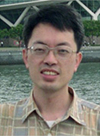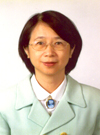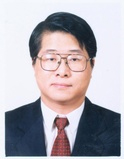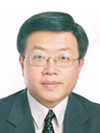
 |
||
|
::: Eight NTU Professors Won Awards from Ministry of Education |
||
|
The Council of Academic Reviewal and Evaluation announced the winners of its 13th National Chair Professorship Award and the 53rd Academic Awards recently. NTU has eight professors among the winners. Below are their brief introductions. The 13th National Professorship Award has a total of 8 winners. Of which NTU has three. Their names and backgrounds are as follows: In Math and Natural Sciences category: Dr. Chin-Lung Wang (Department of Mathematics)
Professor Wang's main research area lies in pairs of rational geometry of algebraic geometry, Calabi-Yau manifold of the moduli space and its related theories of topology, arithmetic geometry and quantum geometry. In recent years he devoted himself to the study of geometrical analysis, partial differential equations, and especially the critical point of distribution problems of Green functions. Professor Wang is noted for his research excellence. He has won many awards in the past, including: the National Science Council's Outstanding Award in 2000 and 2004, the World Chinese Congress of Mathematicians (ICCM-2001), the Morningside Silver Prize in Mathematics the 2002 Ta-You Wu Memorial Award,, the 2003 Zhong-shan Scholarship Award, the Chern Fellow from 2004-2008, the Ministry of Education' s Academic Award, etc.
Professor Chang actively participated in international academic arena. She served as the managing editor for SCI magazine Liver International (IF=2.344) and was on the editorial committee of Hepatology and J. Pediatr Gastroenterol Nutr. She was a trustee of Asia Pacific Pediatric Liver and Gallbladder Gastrointestinal Nutrition Society, Asian Society for Pediatric Research, a member of the United States AASLD Program Assessment Committee, and recently she was elected to be the President of World's Pediatric Liver and Gallbladder Gastrointestinal Nutrition Society. In addition, she has acquired the right to host the 2012 World Conference of Pediatric Liver and Gallbladder Gastrointestinal Nutrition Society which is held once every four years. Among Professor Chang's major academic achievements are: 1.She proposed the first human evidence of anti-cancer vaccine; 2. She discovered the new exclusive liver cancer causing genes on the Y chromosome RNA binding keynote gene (referred to as RBMY); 3. She came up with the longest term evidence internationally, proving that B hepatitis vaccines are effective in preventing B hepatitis related diseases; 4. She provided data and evidence on the study of B hepatitis natural history during one's childhood years. Data and evidence pertaining to such studies are lacking in international literature; 5. Cholestatic syndrome genetic diagnosis and screening to achieve the effectiveness of early treatment.
Professor Chen completed the first super sized integrated circuit chip designed by students, and the chip was able to function normally during the first cut. He was seminal in founding the Electronics Institute at NTU in 2000, whereupon he spared no efforts in cultivating domestic and foreign talents in the semi-conductors filed. From 2004 to 2006 he served as the Director of Electronics Industrial Research Institute of Hsinchu Industrial Technology Research Institute. Since 2007, he served as the co-host for national chip projects. He is currently a professor by special appointment at the Institute of Electronics at NTU. His excellent research achievements received wide international recognition. Professor Chen was elected to IEEE fellowship in 2001, and was nominated as the distinguished lecturer from 2001-2002 in the IEEE Circuits and Systems. From 1995 onwards, he served on the editorial board of IEEE's famous journals, such as Video Technology, VLSI System and Circuits and Systems Part II. In addition to his stellar performance in publishing papers, Professor Chen also devotes himself to the transfer of technology. These technologies include JPEG, MPEG-4, H.264/AVC etc., video codec technology and their frameworks. So far more than ten manufactures have benefitted from his transfer, and the amount of transfer has exceeded 60 million N.T. dollars, which is rare among academics. Professor Chan has received numerous awards in the past. This time he receives the National Chair Professorship Award from the Ministry of Education, the glory is well deserved. The 53rd Academic Award had 13 winners, of which NTU has five. Their names and backgrounds are as follows: In the arts and humanities category: Dr. Christian Helmut Wenzell –(Department of Philosophy)
Professor Wenzell acquired his doctorate in mathematics in 1990. His dissertation was on algebraic geometry. From 1990 to 1991 he was a visiting scholar at The Institute of Fundamental Research at Bombay, India and Madras. From 1991 to 1998 he was an assistant professor at the University of Wuppertal at Germany, while engaging in philosophical research. And from 1995 onwards, he was also a visiting professor at L'encole Normale Superieure at Paris, France. In 1999 he earned his doctorate from University of Wuppertal with a dissertation on Kant. In the following two years he won the alexander von Humboldt from Germany. From 1999 to 2000 he taught at Harvard University and Boston University. From 2000 to 2001 he went to Duke University and North Carolina University at Chapel Hill. From the Fall of 2001, Professor Wenzell started to teach at Chi-nan University. In the Spring of 2002, he taught summer courses at the University of Munich. In 2004 he outstanding research award from the National Science Council. In 2005 he was promoted to the rank of full professor. Fom 2005 to 2006 he did research in Stanford University, and in the Spring of 2009 he came to teach at the Department of Philosophy of NTU. Professor Wenzell's research areas: Kant, the philosophy of language, epistemology, aesthetics, Chinese philosophy, and the philosophy of mathematics. He can teach math and philosophy in German, English, Chinese and French. Ordinarily he plays piano to entertain himself. He likes to read literature and is Conversant in both Latin and Ancient Greek.
Professor Fang has won the Outstanding Research Award from the National Science Council five times (1987-1996), the Zhong-Shan Scholarship Award (1992), the National Science Council's Special Research Fellowship Award twice (1997-2003), the Chinese Chemical Society Award (1997), National Taiwan University Distinguished Teaching Award (1999)., Outstanding Talent Lectures (1999-2004), Yung-shin Pharmaceutical Technology Award (2009), the Ministry of Education Academic Award (2009), etc. He is now a tenured professor at NTU (from 2006). Professor Fang's laboratory places its emphasis on bio-organic synthetic chemistry.. It lays its foundation on the analysis of natural products, then applies the analysis to the development of new drugs and the synthesis of natural products. Over the last twenty years Professor Fang's research achievements are: 1. The new synthetic methods and asymmetric catalytic reactions; 2. Natural products and the study of their activities; Bio-molecular recognition and nano bio-technology; 4. Drug developments; 5. Academia/industry cooperation, development of anti-biotics, laser dyes, biotin, dyes, and detection of malachite green photosensitive drum antibodies.
Professor Chen is the Executive Editor of "Bulletin of Humanities and Social Sciences" published by the Research Center for Humanities and Social Sciences of Academia Sinica. He is also the managing editor of "Economics Papers" published by the Department of Economics, National Taiwan University, among others. From 2006 onwards, Professor Chen is the CEO of the System and Behavior Research Center. He had won National Science Council's Outstanding Research Award in 1997, Academia Sinica's Young Sholarly Writing Award in 1996 and National Science Council's Ta-Wei Wu Memorial Award in 2002, National Science Council's 2008-2011 Outstanding Scholars Research Projects, etc.
Professor Peng's area of specialization lies in regional economy, industrial economy and international trade. He is now an editor for "The Annals of Regional Science", "International Journal of Economic Theory," and "Academia Economic Papers", among others. He received the Excellence in Research Award from National Science Council in 1993, the Republic of China Urban Planning Society's 16th "planning award" in 2003, and the first "Taiwan Sankei Paper Award" issued by Taiwan Sankei Society, and the National Science Council's Outstanding Research Award in 2007.
After he returned to Taiwan to teach at NTU in 1996, Professor Chen continue to devote himself to database and data mining. The papers which he published in the areas of data mining were widely quoted, and he was considered to be a scholar with leading knowledge in data mining. Many of the technologies which he published were important subjects in academia, and were widely used by industries. In addition to having his papers published in top notch journals (over 80 papers published in IEEE Transactions and ACM journals) and international conferences (over 170 presentations), he also edited two books which are published by Springer Verlag. And he obtained 22 international patents from his research which were put to practical use in actual products. According to the survey of Google Scholar, Dr,. Chen's research results were quoted more than 8000 times, which was considered to be the highest among electrical engineering and information science scholars. Dr. Chen was on the editorial board for IEEE Trans on Knowledge and Data Eng., VLDB Journal, Knowledge and Information System(KAIS), Journal of Information Science and Eng.(JISE), and The International Journal of Electrical Engineering, where he is responsible for reviewing articles related to data mining and database. Dr, Chen's stellar performance in research made him become an ACM fellow and an IEEE fellow. He also received Outstanding Research Award from the National Science Coucil, the Teco Award, the Pan Wen-Yuan Outstanding Research Award, and the Information Medal of Honor. He was invited twice to become the Distinguished Vistor for IEEE Computer Society (1998 and 2005). It is worth mentioning that ACM established its Fellow program in 1993. Every year it selects its fellows once. Out of over 80,000 members, only thirty were selected to become fellows, at a ratio of 4/10000, so the selection process was extremely rigorous. Up to now only 24 Chinese scholars were selected to become fellows, and among them 9 received college education in Taiwan. Dr. Chen was one of the very few (so far only two) who were selected to become fellow of ACM while working on a job in Taiwan. In this sense he is extremely rare. |
||
No. 1, Sec. 4, Roosevelt Road, Taipei, 10617 Taiwan(R.O.C.)
Phone: +886-2-3366-3366 Fax: +886-2-2362-7651
 Professor Chin-Lung Wang acquired his Ph.D. degree from Harvard under the tutelage of Academia Sinica academician Shing-Tung Yaw in 1998. Because of his excellent performance in Hodge theory and Calabi Yau moduli space, he was nominated to become a young researcher at Harvard before his graduation. However, due to family reasons, he had to give up this rare opportunity and return to Taiwan. He had taught at the Math departments of National Taiwan University, the Tsing-hua University, and the National Central University. Finally, he came to teach at NTU in 2008.
Professor Chin-Lung Wang acquired his Ph.D. degree from Harvard under the tutelage of Academia Sinica academician Shing-Tung Yaw in 1998. Because of his excellent performance in Hodge theory and Calabi Yau moduli space, he was nominated to become a young researcher at Harvard before his graduation. However, due to family reasons, he had to give up this rare opportunity and return to Taiwan. He had taught at the Math departments of National Taiwan University, the Tsing-hua University, and the National Central University. Finally, he came to teach at NTU in 2008. Professor Mei-Hwei Chang graduated from NTU's Department of Medicine in 1974. She has served as a professor of Pediatrics at NTU since 1990. In 1986 she was elected as one of the ten outstanding young women, and later on she has won many awards. Professor Chang is devoted to hepatitis and liver cancer research. The research team under her tutorship won the outstanding group award from NTU Hospital in 2008. And the group has published 67 referred papers in the last five years, of which 5 were above IF10, 9 were between IF 5-10. In addition, Professor Chang completed 12 theses that were invited internationally, which contained two chapters on children digestion and children liver, and a chapter on anti-cancer vaccine which will be published in Switzerland in a book called "Recent Results in Cancer Research."
Professor Mei-Hwei Chang graduated from NTU's Department of Medicine in 1974. She has served as a professor of Pediatrics at NTU since 1990. In 1986 she was elected as one of the ten outstanding young women, and later on she has won many awards. Professor Chang is devoted to hepatitis and liver cancer research. The research team under her tutorship won the outstanding group award from NTU Hospital in 2008. And the group has published 67 referred papers in the last five years, of which 5 were above IF10, 9 were between IF 5-10. In addition, Professor Chang completed 12 theses that were invited internationally, which contained two chapters on children digestion and children liver, and a chapter on anti-cancer vaccine which will be published in Switzerland in a book called "Recent Results in Cancer Research." Earning his doctorate from National Cheng-kung University's Electronics Institute in 1984, Professor Liang-Gee Chen was the first native doctorate in the area of CAD. In 1988 he came to teach at the Electrical Engineering Department of NTU, whereupon he decided to choose particular purpose digital signal processor hardware and system design as his research direction, focusing on digital video IC related technology research and development. In 1989 he was commissioned by the National Science Council to conduct research on multi-functional chip design, and immediately afterwards he was instrumental in pushing the establishment of Chip Implementation Center, which was a key in establishing a high quality research environment for Taiwan IC design.
Earning his doctorate from National Cheng-kung University's Electronics Institute in 1984, Professor Liang-Gee Chen was the first native doctorate in the area of CAD. In 1988 he came to teach at the Electrical Engineering Department of NTU, whereupon he decided to choose particular purpose digital signal processor hardware and system design as his research direction, focusing on digital video IC related technology research and development. In 1989 he was commissioned by the National Science Council to conduct research on multi-functional chip design, and immediately afterwards he was instrumental in pushing the establishment of Chip Implementation Center, which was a key in establishing a high quality research environment for Taiwan IC design. Dr. Christian Helmut Wenzell, a German Professor hired by the Department of Philosophy only last February, once studied mathematics, physics, philosophy and art at Universities of Wurzburg, Bonn, University of Wuppertal, New York State University at Albany and University of Illinois at Urbana/Champaign.
Dr. Christian Helmut Wenzell, a German Professor hired by the Department of Philosophy only last February, once studied mathematics, physics, philosophy and art at Universities of Wurzburg, Bonn, University of Wuppertal, New York State University at Albany and University of Illinois at Urbana/Champaign. Professor Jim-Min Fang earned his doctorate from Yale University in 1980 with a specialization on organic synthesis, asymmetric catalysis, natural products chemistry, pharmaceutical chemistry, and nanotechnology and bio-molecular recognition and other important areas. So far he has published more than 200 papers, has many patents, and has written "organic synthesis" in three books
Professor Jim-Min Fang earned his doctorate from Yale University in 1980 with a specialization on organic synthesis, asymmetric catalysis, natural products chemistry, pharmaceutical chemistry, and nanotechnology and bio-molecular recognition and other important areas. So far he has published more than 200 papers, has many patents, and has written "organic synthesis" in three books Professor Kong-Pin Chen earned his doctorate in Economics from University of Rochester in 1993. Then he returned to Taiwan to serve at the Institute of Social Sciences at Academia Sinica. From the eighties onwards, the Taiwan society has undergone considerable changes, and many of Professor Chen's research topics had to do with these developments. Such as the referendum system and the primary elections of political parties, the study of physician's payment system of health care the Filipino Thai laborers in Taiwan and their immigration patterns, and the huge difference in the migratory patterns of Taiwan nationals (such as the little children studying abroad, doctors going to the U.S to open restaurants), he derived a new theoretical model of immigration. In addition, the changes that the Ministry of Finance made on the system of inheritance tax was based on the report that he was commissioned to write. Originally the pressure from the legislators were so huge, that the legislators thought that by repealing the inheritance tax overseas capital would come back to Taiwan, but Professor Chen's report estimated that even if the inheritance tax were cut to half, a large source of tax revenues would be lost. So the Ministry of Finance only made small changes for inheritance tax.
Professor Kong-Pin Chen earned his doctorate in Economics from University of Rochester in 1993. Then he returned to Taiwan to serve at the Institute of Social Sciences at Academia Sinica. From the eighties onwards, the Taiwan society has undergone considerable changes, and many of Professor Chen's research topics had to do with these developments. Such as the referendum system and the primary elections of political parties, the study of physician's payment system of health care the Filipino Thai laborers in Taiwan and their immigration patterns, and the huge difference in the migratory patterns of Taiwan nationals (such as the little children studying abroad, doctors going to the U.S to open restaurants), he derived a new theoretical model of immigration. In addition, the changes that the Ministry of Finance made on the system of inheritance tax was based on the report that he was commissioned to write. Originally the pressure from the legislators were so huge, that the legislators thought that by repealing the inheritance tax overseas capital would come back to Taiwan, but Professor Chen's report estimated that even if the inheritance tax were cut to half, a large source of tax revenues would be lost. So the Ministry of Finance only made small changes for inheritance tax.
 Professor Shin-Kun Peng earned his doctorate from the University of Pennsylvania in 1989. From 1989 to 1996 he served as associate researcher in the Institute of Economics at Academia Sinica. From 1996 onwards he was promoted to research fellow. From 1997 to 2001 he served as Director of the 2nd unit, from 2002 to 2004 he served as Deputy Director; from 1995 to 1997 he served as adjunct professor at National Taiwan University. From 1997 to 1998 he was a visiting scholar at Washington University at St. Louis, from 2000 to 2003 he was the convenor for regional studies and geography at the humanities division of National Science Council, from 2003 he was adjunct professor for the Institute of Building and Planning at NTU, while serving as adjunct professor for the Institute of Economics at NTU, in 2004 he was the visiting professor to the Institute of Economics at Kyoto University. From 2005 onwards he was the Executive Editor for the papers published by the Economics Institute of Academia Sinica. In 2006 he was appointed Deputy Executive Secretary of the Academic Advisory Association of Academia Sinica. From 2007 he was appointed Director of the Institute of Economics, Academia Sinica.
Professor Shin-Kun Peng earned his doctorate from the University of Pennsylvania in 1989. From 1989 to 1996 he served as associate researcher in the Institute of Economics at Academia Sinica. From 1996 onwards he was promoted to research fellow. From 1997 to 2001 he served as Director of the 2nd unit, from 2002 to 2004 he served as Deputy Director; from 1995 to 1997 he served as adjunct professor at National Taiwan University. From 1997 to 1998 he was a visiting scholar at Washington University at St. Louis, from 2000 to 2003 he was the convenor for regional studies and geography at the humanities division of National Science Council, from 2003 he was adjunct professor for the Institute of Building and Planning at NTU, while serving as adjunct professor for the Institute of Economics at NTU, in 2004 he was the visiting professor to the Institute of Economics at Kyoto University. From 2005 onwards he was the Executive Editor for the papers published by the Economics Institute of Academia Sinica. In 2006 he was appointed Deputy Executive Secretary of the Academic Advisory Association of Academia Sinica. From 2007 he was appointed Director of the Institute of Economics, Academia Sinica. Professor Ming-Syan Chen earned his doctorate from the University of Michigan in 1988. Upon graduation he joined the IBM Thomas J. Watson Research Center in New York state to conduct research. His primary research area was distributed and parallel query processing where he made concrete and important contributions. His contributions were utilized in IBM's DB2 Parallel Edition and acquired the IBM Outstanding Innovation Award, and many other patents.
Professor Ming-Syan Chen earned his doctorate from the University of Michigan in 1988. Upon graduation he joined the IBM Thomas J. Watson Research Center in New York state to conduct research. His primary research area was distributed and parallel query processing where he made concrete and important contributions. His contributions were utilized in IBM's DB2 Parallel Edition and acquired the IBM Outstanding Innovation Award, and many other patents.